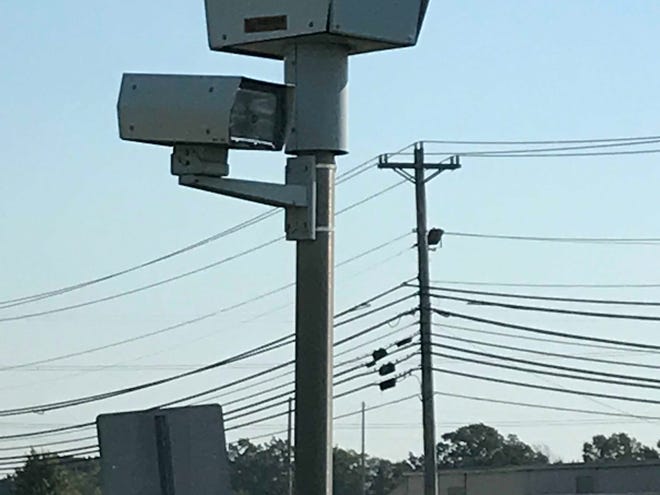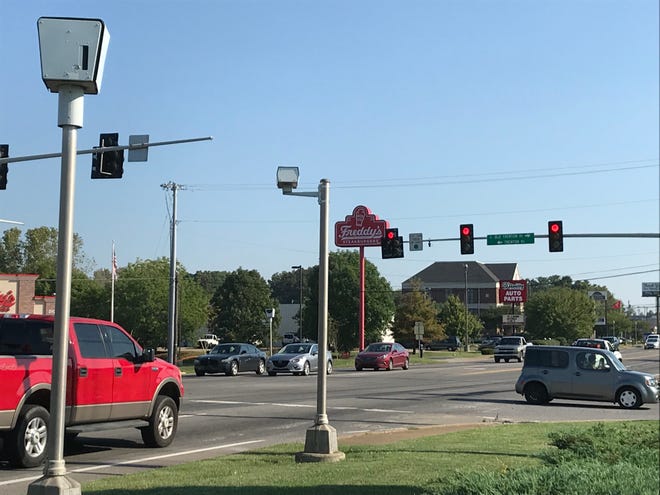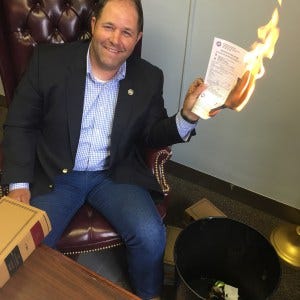Do You Have To Pay Speeding Camera Tickets In Tennessee

Taijarae Miller has spent much of her life living in Clarksville, and considers herself a constabulary-constant citizen. But she's quick to admit she's gotten three red-light camera tickets over the years.
When she got the first two, she paid them without a thought.
"I never actually had a problem with it," she said. "I always felt that I ran the light, so I volition become ahead and pay the ticket."
Merely when she recently received her 3rd red-light ticket, Miller noticed a disclaimer on the commendation with ii alien statements.
The first one said, in all caps, "Payment is required by police force." But in the very next line, the citation said: "Non-payment of this observe cannot adversely bear upon your credit score or report, driver's license, and/or motorcar insurance rates."

Miller decided to reach out to inquire a customs conversation group on social media to weigh in on whether she should transport in her $50 to settle the ticket.
The response was immediate, overwhelming and contradictory.
"No intentions on paying."
"You better. Your license will exist revoked."
"I've gotta stack that goes dorsum to 2010 ... never paid 1."
"It will just get to collections."
"It's not enforced, and you lot're just lining the pockets of a third party gotcha program. It's not admissible in court."
"You do get points added to your license if not paid."
"It's a scam. You exercise not accept to pay information technology. It's not legal."
After near 300 comments, Taijarae was still no closer to getting her question answered.
Then The Foliage-Chronicle investigated on her behalf.
Caught on camera
Clarksville'due south reddish-light cameras are run by Redflex Traffic Systems, an Australian-based visitor responsible for installing and maintaining the cameras.
Right now, the city has seven crimson-light cameras installed at four intersections:
- Wilma Rudolph Boulevard and Trenton Road.
- Wilma Rudolph and Interstate 24.
- Wilma Rudolph and Dunbar Cave Road.
- 101st Airborne Sectionalization Parkway and Whitfield Route.
But the program could presently be expanding.
The Clarksville Police Department say information technology's looking into installing cameras at four boosted intersections, selected based on their loftier crash rates.

When someone runs a ruby-red calorie-free at a camera-monitored intersection, photos and a video are taken. Redflex pre-screens the video and sends a list of all possible violations to the CPD.
Per state law, those violations must be validated by a sworn officer of the constabulary.
CPD Lt. Vincent Lewis, traffic unit commander, says that's exactly what happens.
"The No. ane misconception is that Redflex is issuing a citation," he said. "Every single video has to be reviewed and validated past a sworn police officeholder."
As Lewis points out, if there are any questions almost the violation — due to a blurry camera epitome, bad conditions, the plates not matching up or whatsoever number of other reasons — the commendation is voided.
Like WHAT YOU See?Back up local journalism with a digital subscription
"We look for articulate violations," he explained, demonstrating how the section backs up the video while reviewing information technology to determine the verbal position of the car and its altitude from the intersection when the light turned ruby-red. He points out that the lights are timed to let at least 4.v seconds for a yellow warning light, so drivers have more than enough time to stop.
Once the citation is certified, Redflex problems the $l ticket to the registered possessor of the vehicle.
For police, it's a matter of public safe.
"We have to use as many tools as we can," Lewis said. "This is i of many tools that we have to try to make (the roads) safer."
Just he admits it'south tough to provide empirical prove that Clarksville's red-calorie-free cameras are accomplishing that goal, and he points to the area'southward rapid growth every bit the reason.
"Based on the increase of the population here, we are not seeing the decrease (in blood-red-light runners) that we had hoped to see," Lewis said. "The rapid growth makes it difficult to quantify how much influence the cameras are having."
Who gets the money?
People who go a citation in the postal service can choose to pay the fine, go to urban center courtroom to fight the fine or ignore the ticket altogether.
Police gauge that on average, but a couple people per month fight the tickets. The police force officer who certifies the ticket must also appear in court, should someone choose to exercise the correct to due process.

Every bit for the money nerveless from those who pay up?
The city of Clarksville spits the revenue with Redflex. Of the coin received by the city, 75 percent goes to law and the rest goes to the parks department.
Simply Lewis says information technology'southward not a matter of coin.
"It'south nearly educating people," he said.
These days, a growing number of people seem to be choosing option three — but ignoring the ticket. Most argue that the tickets themselves are not lawful. It's a position that seems to be reinforced by a lack of consequences, as spelled out on the citations.
Legal controversy
Controversy surrounding the red-light photographic camera program came to a head in 2016, when Land Rep. Andy Holt, a Republican from Dresden, burned i of his own tickets in a video that went viral.
It happened after he sponsored a bill to outlaw the apply of the cameras in a previous session. The last version of that bill, which passed the General Assembly, just banned the use of some speed cameras.

In 2016, Holt sponsored another bill that became state police force, requiring traffic camera vendors to include the statement on citations that reads, "non-payment of this notice cannot adversely affect your credit score or written report, driver's license, and/or automobile insurance rates."
But many citations — like the ane Taijarae received — besides say payment is required by police.
Holt believes that, as well, is a violation of state police force. He says he plans to have his fight to the courts, even though the Tennessee Attorney General'southward Office has thus far upheld the constitutionality of the programme in every challenge.
"My goal is to ultimately eliminate all photograph enforcement in the country of Tennessee," said Holt in a recent phone interview. "Putting a camera at an intersection doesn't practice anything to improve safety and deter criminal activity."
Holt contends that the law allowing photo enforcement tools was fundamentally flawed from the start, because the same crime cannot exist both criminal and civil in the optics of the state.
Instead, he views it every bit an unscrupulous exercise that privatizes police power for turn a profit.
But do you take to pay?
Opponents of traffic cameras, like Holt, fence you do not take to pay.
"As a Tennessee state lawmaker," said Holt, "I am encouraging people not to pay these tickets ever."
And the truth is, with no real consequences for not-payment besides the possibility that unpaid tickets could be reported to a collections agency, in that location is little incentive to pony up the fine.
Furthermore, the chances that any unpaid fines would be reported to collections are slim. That'southward because Redflex says it's up to the metropolis of Clarksville to do so, while metropolis officials say information technology's upward to Redflex.
And then, the brusque reply is no, you lot don't have to pay.
But for police officers like Lewis, who must deal with the repercussions of every fatal accident in Clarksville, a number which totaled at least a dozen so far this twelvemonth, the fine is not the point.
"To me, the effect is whether they run the cherry-red lite," he said. He added that for people who do pay, much of that money goes back into the enforcement program, thus providing some flake of restitution for violating the constabulary.
For Lewis, the answer and the overall goal is simple: "Don't run the blood-red light."
And his response to folks similar Holt, who question the lawfulness of the program?
"Information technology will exist an effect with those types of people until they take a family member killed," he said.
Miller said she'll likely go alee and pay the ticket.
"I just don't want it to come back and bite me," said said.
In the futurity, she plans to slow downwards and be more enlightened when driving through those intersections — exactly what officers like Lewis hope to hear.
Reach Jennifer Babich at 931-245-0742 or past e-mail at jbabich@gannett.com.
Source: https://www.theleafchronicle.com/story/news/local/clarksville/2018/09/26/red-light-camera-ticket-do-you-have-pay-clarksville/1357010002/
Posted by: smithsichim.blogspot.com


0 Response to "Do You Have To Pay Speeding Camera Tickets In Tennessee"
Post a Comment